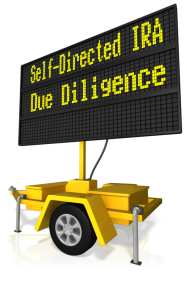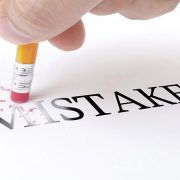Due Diligence in Self-Directed IRAs
 Chances are good everything important you ever learned about investing you learned in kindergarten: Look both ways before crossing. Don’t get in a windowless van with strangers. Check the weather before running outside. Adulthood and investing – including Self-Directed IRA investing – is simply the application of these basic principles to ever more complex situations. In the investment context, the application of these basic principles of self-protection is called due diligence.
Chances are good everything important you ever learned about investing you learned in kindergarten: Look both ways before crossing. Don’t get in a windowless van with strangers. Check the weather before running outside. Adulthood and investing – including Self-Directed IRA investing – is simply the application of these basic principles to ever more complex situations. In the investment context, the application of these basic principles of self-protection is called due diligence.
It’s vital in any investment context – but it’s especially so for our clients who use Self-Directed IRAs and other retirement accounts for a few reasons:
- These individuals take on much more concentrated positions in specific investments than people who invest their retirement funds in a mix of mutual funds that may well contain thousands of individual securities. These people diversify away any company-specific risk, but also diversify away any potential company-specific upside, as well!
- Retirement security is usually just as vital for Self-Directed IRA owners as it is for everyone else.
Due diligence is the analytical process by which any investor works to reduce the chances of and severity of loss, first, before it focuses on potential gains. Don’t worry… the security salespeople and the people selling your interest will make sure you are aware of the investment’s upside potential! You won’t have to make much of an effort.
You can find a basic list of due diligence questions anywhere on the web. For example, look here, here and here. And reading through these documents from experienced entrepreneurs and investors who have purchased and sold many companies themselves is an education for just about anyone. But there are certain aspects to due diligence that apply especially within the context of Self-Directed IRAs and other retirement accounts.
- Consider the purpose of the investment. What is the timeline for a startup, venture capital, or private equity investment to bear fruit? Does it match up well with when you will need to begin drawing income out of the business? Any investment you make within a Self-Directed IRA needs to serve the eventual purpose of generating retirement income security – for you.
- How will the investment interact with RMD rules? In traditional IRAs and 401(k)s, you must begin taking distributions by April 1st of the year following the year in which you turn age 70½. Will you have enough liquidity in the account at that time to do so?
- Consider asset location. Is a retirement account the best place for this kind of investment? Or do you want to do it in a taxable account and save your allowable contributions to a Self-Directed IRA or other retirement account for other assets? A big part of this decision comes down to whether you would rather be subject to ordinary income taxes and RMDs
- Don’t forget about unrelated debt-financed income. If you use borrowed money to acquire a property in a Self-Directed IRA, you may have to pay some tax on income attributable to that borrowed money – even within the IRA. You should plan ahead to have enough cash available from somewhere to pay that tax. If this is a problem, and you are self-employed or own your won corporation, maybe you could hold the same investment within a self-directed solo 401(k). In this case, you may be able to avoid this tax. Call us for more details about this.
- Will the investment require future injections of cash? Where will it come from? Remember, IRA contributions are limited to $5,500 per year in 2014 (add another $1,000 for those age 50 or older). Anything over that will have to come from rollovers from other retirement accounts or from borrowed money. Will you be able to maintain the investment, given the legal constraints?
As you can see, a lot of these issues are specific to the topic of Self-Directed IRAs and self-directed 401(k)s. Your due diligence shouldn’t just be focused on the company itself, but also it should be done in light of the specific context of Self-Directed IRA investing.
For more information, visit us at www.americanira.com, or call us at 1-866-7500-IRA (472). We look forward to hearing from you.
Image by: presentermedia.com






